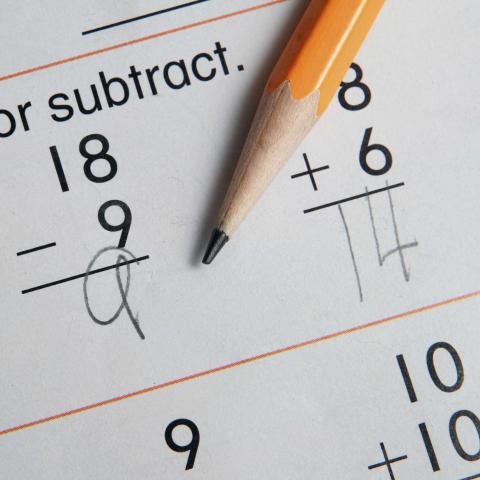
Being able to express the timing of an action is a key skill to acquire when learning a foreign language. Did it happen yesterday? Is it going to happen next year? Or maybe it’s happening right now, as you read this?
In most languages, tenses are used to accomplish this. A tense is a grammatical concept that can be applied to verbs through conjugation. For example, in English you could express the past, present, and future this way:
- I walked.
- I am walking.
- I will walk.
But there’s some good news for Thai learners: There are no Thai tenses you need to learn! Thai is a tenseless language and we have other (much simpler) ways of expressing time as it relates to actions.

Thai has no tenses to worry about.
 Table of Contents
Table of Contents
1. An Overview
Because there are no tenses in Thai, there’s no verb conjugation either. We use the same form of a verb regardless of when the action took place.
For example:
Past tense
- เมื่อเช้านี้ ฉันกินขนมปัง
- mûuea-cháao-níi chǎn gin khà-nǒm-phang
- This morning, I ate bread.
Present tense
- ฉันกินขนมปังทุกวันตอนเช้า
- chǎn gin khà-nǒm-phang thúk-wan dtaawn-cháo
- I eat bread every day in the morning.
Present continuous tense
- ฉันกำลังกินขนมปัง
- chǎn gam-lang gin khà-nǒm-phang
- I am eating bread.
Present perfect tense
- ฉันกินขนมปังทุกวันมาตั้งแต่เด็ก
- chǎn gin khà-nǒm-phang thúk-wan maa dtâng-dtàae-dèk
- I have eaten bread every day since I was young.
Future tense
- ฉันจะกินขนมปังพรุ่งนี้เช้า
- chǎn jà gin khà-nǒm-phang phrûng-níi-cháo
- I will eat bread tomorrow morning.
You can see from the sentences above that despite the action taking place at different times, the verb (bolded) is the same in each sentence. In Thai, we use different “time words” (auxiliary verbs or prepositions) to indicate the timing of the action and to provide context.
2. How to Indicate Time in the Thai Language
In order to indicate the time or context of an action in Thai, you need to know how Thai people express time in sentences. In addition to knowing how to tell the time (whether it’s 6 a.m. or midnight, for example), you should know the vocabulary used to talk about the present, past, and future.
A. Present
There are several words used to talk about the present in Thai. We’ve categorized them for you below and provided examples for each one.
1- Now
ตอนนี้ (dtaawn-níi) is “now” in Thai. This is a safe word choice you can use in almost any situation.
- ตอนนี้ อากาศที่ลพบุรีร้อนมาก
- dtaawn-níi aa-gàat thîi lóp-bù-rii ráawn-mâak
- Now, the weather at Lopburi is very hot.
ขณะนี้ (khà-nà-níi) is another word for “now.” Compared to ตอนนี้ (dtaawn-níi), ขณะนี้ (khà-nà-níi) is more formal. You would usually hear this word in the news, for example.
- ขณะนี้เวลา 8 นาฬิกา 15 นาที
- khà-nà-níi wee-laa bpàaet-naa-lí-gaa sìp-hâa-naa-thii
- Right now, it is 8:15.
เวลานี้ (wee-laa-níi) – “this time”
- เวลานี้คือช่วงเวลาที่ดีในการซื้อคอนโด
- wee-laa-níi khuue chûuang-wee-laa-thîi-dii nai gaan-súue-khaawn-doo
- Now is a good time to buy a condo.
เดี๋ยวนี้ (dǐiao-níi) – “right now”
- เธอต้องไปเดี๋ยวนี้เลย ไม่งั้นสาย
- thooe dtâawng bpai dǐiao-níi looei mâi-ngán sǎai
- You have to go now or else you will be late.

You have to go now or else you will be late.
2- The current period
ปัจจุบันนี้ (bpàt-jù-ban-níi) – “currently”
- ปัจจุบันนี้ เกือบทุกคนมีมือถือเป็นของตัวเอง
- bpàt-jù-ban-níi gùueap-thúk-khon-mii-muue-thǔue-bpen-khǎawng-dtuua-eeng
- Currently, almost everyone owns a mobile phone.
ช่วงนี้ (chûuang-níi) – “recently”
- ช่วงนี้ ฉันออกกำลังกายทุกวัน
- chûuang-níi chǎn-àawk-gam-lang-gaai-thúk-wan
- As of recently, I exercise every day.
3- Time unit + นี้
Another way you can tell time in the present tense is to use the structure “time unit + นี้” which means “this + time unit” in Thai. Below are a few examples of this structure.
วันนี้ (wan-níi) – “today”
- วันนี้เป็นวันอังคาร
- wan-níi-bpen-wan-ang-khaan
- Today is Tuesday.
สัปดาห์นี้ (sàp-daa-níi) – “this week”
- สัปดาห์นี้ ฉันงานยุ่งมาก
- sàp-daa-níi chǎn-ngaan-yûng-mâak
- This week, I’m very busy.
เดือนนี้ (duuean-níi) – “this month”
- เดือนนี้ ฉันอยู่ที่พัทยา
- duuean-níi chǎn-yùu-thîi-phát-thá-yaa
- This month, I’m in Pattaya.
ปีนี้ (bpii-níi) – “this year”
- ปีนี้ มีโรคระบาด
- bpii-níi mii-rôok-rá-bàat
- This year, there is an epidemic.
4- ทุก + time unit
You can also use the structure “ทุก + time unit” which means “every time unit” in Thai. Here are some examples:
ทุกวัน (thúk-wan) – “every day”
- พ่อว่ายน้ำทุกวัน
- phâaw-wâai-náam-thúk-wan
- Dad swims every day.
ทุกวันจันทร์ (thúk-wan-jan) – “every Monday”
- แม่ไปตลาดทุกวันจันทร์
- mâae-bpai-dtà-làat-thúk-wan-jan
- Mom goes to the market every Monday.
ทุก 2 สัปดาห์ (thúk-sàp-daa) – “every week”
- น้องสาวของฉันไปร้านหนังสือทุก 2 สัปดาห์
- náawng-sǎao-khǎawng-chǎn-bpai-ráan-nǎng-sǔue-thúk-sàp-daa
- My younger sister goes to a bookshop every 2 weeks.
ทุก 3 เดือน (thúk-duuean) – “every month”
- คุณยายไปหาหมอทุก 3 เดือน
- khun-yaai-bpai-hǎa-mǎaw-thúk-sǎam-duuean
- Grandmother goes to see a doctor every 3 months.
ทุกปี (thúk-bpii) – “every year”
- ครอบครัวของเราไปทะเลทุกปี
- khrâawp-khruua-khǎawng-rao-bpai-thá-lee-thúk-bpii
- Our family goes to the sea every year.
B. Past
Just as we saw for the present tense, there are many words we can use to describe past events in Thai. Let’s take a look!
1- In the past
ในอดีต (nai-à-dìit) means “in the past” in Thai. It refers to any period that took place more than fifty years ago.
- ในอดีต คนไทยเดินทางโดยเรือเป็นหลัก
- nai-à-dìit khon-thai-dooen-thaang-dooi-ruuea-bpen-làk
- In the past, Thai people mainly traveled by boat.

In the past, Thai people mainly traveled by boat.
เมื่อก่อน (mûuea-gàawn) is another word for “in the past.” This one is used when referring to past events that took place not as long ago. It’s often used to talk about things that used to happen in the past, but no longer happen nowadays.
- เมื่อก่อน ฉันเคยไม่กินผัก
- mûuea-gàawn chǎn-khooei-mâi-gin-phàk
- In the past, I used to not eat vegetables.
ก่อนหน้านี้ (gaawn-hnaa-nii) means “before this time.” It also refers to a time in the past, but usually in reference to something that has just happened.
- ฉันเพิ่งกินมาก่อนหน้านี้เอง
- chan-phôeng-gin-maa-gàawn-nâa-níi-eeng
- I just ate before this.
2- เมื่อ + time period
The structure “เมื่อ + time period” can be used to refer to a period of time that has just passed.
เมื่อวาน (mûuea-waan) is “yesterday.” This one is special, as วาน does not mean “day” in Thai.
- รัมภาเพิ่งกลับจากฮ่องกงเมื่อวาน
- ram-phaa-phôeng-glàp-jàak-hâwng-gong-mûuea-waan
- Rampa just came back from Hong Kong yesterday.
เมื่อวานซืน (mûuea-waan-suuen) – “the day before yesterday”
- ฉันเพิ่งย้ายมาอยู่ที่นี่เมื่อวานซืน
- chǎn-phôeng-yáai-maa-yùu-thîi-nîi-mûuea-waan-suuen
- I just moved in here the day before yesterday.
เมื่อเช้า (mûuea-chao) – “this morning”
- เมื่อเช้า ฝนตกแรงมาก
- mûuea-cháo fǒn-dtòk-raaeng-mâak
- It rained heavily this morning.
เมื่อกลางวัน (mûuea-glaang-wan) – “this afternoon”
- ปรางทำกระเป๋าเงินหายเมื่อกลางวัน
- bpraang-tham-grà-bpǎo-ngoen-hǎai-mûuea-glaang-wan
- Prang lost her wallet this afternoon.
เมื่อเย็น (mûuea-yen) – “this evening”
- ดาวกินเค้กไป 2 ชิ้น เมื่อเย็นที่ผ่านมา
- Daao-gin-khéek-bpai-sǎawng-chín-mûuea-yen-thîi-phàan-maa
- Dow ate 2 pieces of cake this past evening.
เมื่อคืน (mûuea-khuuen) – “last night”
- เมื่อคืนนี้ ต่ายไปนอนบ้านเพื่อน
- mûuea-khuuen-níi dtàai-bpai-naawn-bâan-phûuean
- Last night, Tai slept at her friend’s house.
3- Time unit + ที่แล้ว/ก่อน
The structure “time unit + ที่แล้ว/ก่อน” is like the Thai version of “ago.” Here are some examples:
2 วันก่อน (sǎawng-wan-gàawn) – “2 days ago”
- 2 วันก่อน อากาศร้อนมาก
- sǎawng-wan-gàawn aa-gàat-ráawn-mâak
- The weather was very hot 2 days ago.
3 สัปดาห์ที่แล้ว (sǎam-sàp-daa-thîi-láaeo) – “3 weeks ago”
- พ่อซื้อเสื้อตัวใหม่ให้ฉันเมื่อสามสัปดาห์ที่แล้ว
- phâaw-súue-sûuea-dtuua-mài-hâi-chǎn-mûuea-sǎam-sàp-daa-thîi-láaeo
- Dad bought me a new shirt 3 weeks ago.
5 เดือนที่แล้ว (hâa-duuean-thîi-láaeo) – “5 months ago”
- ร้านกาแฟนี้เพิ่งเปิดเมื่อห้าเดือนที่แล้ว
- ráan-gaa-faae-níi-phôeng-bpòet-mûuea-hâa-duuean-thîi-láaeo
- This coffee shop just opened 5 months ago.
4 ปีก่อน (sìi-bpii-gàawn) – “4 years ago”
- ฉันซื้อรถคันนี้เมื่อสี่ปีก่อน
- chǎn-súue-rót-khan-níi-mûuea-sìi-bpii-gàawn
- I bought this car 4 years ago.
C. Future
Now, let’s go over how to talk about the future in Thai.
1- In the future
ในอนาคต (nai-à-naa-khót) – “in the future”
- ในอนาคต น้ำวางแผนจะย้ายมาอยู่เชียงใหม่
- nai-à-naa-khót náam-waang-phǎaen-jà-yáai-maa-yùu-chiiang-mài
- In the future, Nam plans to move to Chiangmai.
พรุ่งนี้ (phrûng-níi) – “tomorrow”
- ฉันหวังว่าฝนจะไม่ตกวันพรุ่งนี้
- chǎn-wǎng-wâa-fǒn-jà-mâi-dtok-wan-phrûng-níi
- I hope it will not rain tomorrow.
มะรืนนี้ (má-ruuen-níi) – “the day after tomorrow”
- มะรืนนี้ พิมจะสอบเลข
- má-ruuen-níi phim-jà-sàawp-lêek
- Pim will have a math test the day after tomorrow.

Pim will have a math test the day after tomorrow.
2- Time unit + ข้างหน้า
The structure “time unit + ข้างหน้า” is like “in ___ time unit” in Thai. Here are some examples for you:
2 ชั่วโมงข้างหน้า (sǎawng-chûua-moong-khâang-nâa) – “in 2 hours”
- เธอจะมาถึงในอีกสองชั่วโมงข้างหน้า
- thooe-jà-maa-thǔeng-nai-ìik-sǎawng-chûua-moong-khâang-nâa
- She will arrive in 2 hours.
10 วันข้างหน้า (sìp-wan-khâang-nâa) – “in 10 days”
- ฉันจะทำให้เสร็จใน 10 วันข้างหน้า
- chǎn-jà-tham-hâi-sèt-nai-sìp-wan-khâang-nâa
- I will finish this in 10 days.
7 ปีข้างหน้า (jèt-bpii-khâang-nâa) – “in 7 years”
- มีนาจะเกษียณในเจ็ดปีข้างหน้า
- mii-naa-jà-gà-sǐian-nai-jèt-bpii-khâang-nâa
- Meena will retire in 7 years.
3. Auxiliary Verbs and Prepositions
As mentioned above, Thai people also use auxiliary verbs and prepositions to indicate the time of an action. Let’s take a closer look at this through examples.
A- กำลัง
- Thai pronunciation: gam-lang
- English meaning: v.ing
- Word type: auxiliary verb
- How to use: กำลัง + verb
Explanation:
This word is used to show that the subject is doing the action now. Thus, it implies the present continuous tense.
Example 1:
ณัฐพรกำลังเขียนรายงานภาษาอังกฤษอยู่
nát-thà-phaawn-gam-lang-khǐian-raai-ngaan-phaa-sǎa-ang-grìt-yùu
Nattaporn is now writing an English report.
Example 2:
คุณตากำลังรดน้ำต้นไม้
khun-dtaa-gam-lang-rót-nám-dtôn-mái
Grandfather is watering the trees.
B- เคย
- Thai pronunciation: khooei
- English meaning: used to
- Word type: auxiliary verb
- How to use: เคย + verb
Explanation:
This one is used to show that the subject used to do a certain action but no longer does that action now. Thus, it implies the past tense.
Example 1:
เมื่อก่อน แม่เคยขับรถไปส่งฉันที่โรงเรียนทุกวัน
mûuea-gàawn mâae-khooei-khàp-rót-bpai-sòng-chǎn-thîi-roong-riian-thúk-wan
Mom used to drive me to school every day in the past.
Example 2:
มีคณาเคยอยู่ที่พัทลุงตอนเด็ก
mii-khá-naa-khooei-yùu-thîi-phát-thá-lung-dtaawn-dèk
Meekhana used to live in Pattalung when she was young.
C- เพิ่ง
- Thai pronunciation: phôeng
- English meaning: just
- Word type: auxiliary verb
- How to use: เพิ่ง + verb
Explanation:
You can use this word to show that the subject has just completed an action. Thus, it implies the past tense.
Example 1:
นทีเพิ่งอบพิซซ่าเสร็จ รีบมากินเร็ว
ná-thii-phôeng-òp-phít-sâa-sèt rîip-maa-gin-reo
Nathee just finished baking his pizza. Come and eat it quickly.

Nathee just finished baking his pizza. Come and eat it quickly.
Example 2:
เขาเพิ่งเริ่มทาสี
khǎo-phôeng-rôoem-thaa-sǐi
He just started painting.
D- จะ
- Thai pronunciation: jà
- English meaning: will
- Word type: auxiliary verb
- How to use: จะ + verb
Explanation:
This word is used to show that the subject will do a certain action in the future. Thus, it implies the future tense.
Example 1:
วารีจะไปตราดมะรืนนี้
waa-rii-jà-bpai-dtràat-má-ruuen-níi
Waree will go to Trad the day after tomorrow.
Example 2:
เตารีดที่บ้านเพิ่งเสีย พ่อจะไปซื้อเตารีดใหม่เย็นนี้
dtao-rîit-thîi-bâan-phôeng-sǐia phâaw-jà-bpai-súue-dtao-rîit-mài-yen-níi
The iron at my home just broke. Dad will go buy a new one this evening.
E- ตั้งแต่
- Thai pronunciation: dtâng-dtàae
- English meaning: since
- Word type: preposition
- How to use: ตั้งแต่ + starting time
Explanation:
This preposition is used to emphasize the starting time of an action that the subject has been doing. Thus, it implies a perfect tense.
Example 1:
ฉันย้ายมาอยู่ที่ภูเก็ตตั้งแต่ 2009
chǎn-yáai-ma-yùu-thîi-phuu-gèt-dtâng-dtàae-bpii-sǎawng-phan-gâo
I have moved to Phuket and lived here since 2009.
Example 2:
แม่ทำงานเป็นนักบัญชีตั้งแต่อายุ 25 ปี
mâae-tham-ngaan-bpen-nák-ban-chii-dtâng-dtâae-aa-yú-yîi-sìp-hâa-bpii
Mom has worked as an accountant since she was 25 years old.
F- มา
- Thai pronunciation: maa
- English meaning: for
- Word type: preposition
- How to use: มา + length of time
Explanation:
This one is used to tell how long the subject has been doing a certain action. Thus, it implies a perfect tense.
Example 1:
กฤษณาวาดภาพเป็นงานอดิเรกมา 10 ปีแล้ว
grìt-sà-nǎ-wâat-phâap-bpen-ngaan-à-dì-rèek-maa-sìp-bpii-láaeo
Kritsana has been drawing as a hobby for 10 years now.
Example 2:
ฤดีกรไม่สบาย จึงไม่ได้ไปเรียนมา 1 สัปดาห์แล้ว
rúe-dii-gaawn-mâi-sà-baai jueng-mâi-dâi-bpai-riian-maa-nùeng-sàp-daa-láaeo
Ruedeekorn is sick. She hasn’t gone to school for a week now.
4. Conclusion
By now, I bet you feel that this was one of the easiest Thai grammar lessons ever! As long as you keep practicing, it won’t take very long for you to master the essential skill of talking about the past, present, and future in Thai.
What tenses are there in your native language, and how do they work? Do you think that the Thai way of indicating time is easier or harder?
We hope you enjoyed this lesson! If you’d like to continue studying with ThaiPod101.com, we have a few fun recommendations for you:
Create your free lifetime account for the best experience, and learn Thai in the fastest and most fun way possible!










